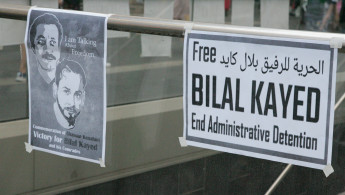Israel concedes to Palestinian detainees' demands after hunger strike
Hundreds of Palestinians prisoners have said they will end a hunger strike in protest against humiliating prison conditions after winning a small victory against their jailors.
2 min read
Dozens of prisoners are continuing the strike in solidarity with Bilal Kayed [Getty]
More than 300 Palestinian prisoners said they had halted a hunger strike on Saturday after Israel was forces to concede to their demands.
The protest was called due to Israel's "humiliating" body searches and the return of recently transferred prisoners, a rights group said.
The detainees - all members of the Hamas movement - started the strike on Wednesday to protest against an Israeli prison crackdown, when some prisoners were locked away in solitary confinement, personal belongings were seized, and prisoners transferred to other facilities.
They agreed to end the strike after prison authorities said they would "stop humiliating naked body searches" and "return recently transferred prisoners", the Palestinian Prisoners Club said.
The Israel Prisons Service said on Friday that it had moved Hamas prisoners, searched cells and seized mobile phones earlier in the week.
They claimed to be acting on "intelligence information about direction of terror from inside prisons".
But dozens of prisoners from the leftist Popular Front for the Liberation of Palestine (PFLP) continued to refuse on Saturday in solidarity with prisoner Bilal Kayed, who has been fasting for 53 days over his detention without trial, said the Prisoners Club.
Kayed was to be released in June after serving a 14-and-a-half-year sentence for activities in the PFLP.
Instead, Israeli authorities ordered that he remain in custody under the administrative detention law, which allows prisoners to be held without trial for renewable six-month periods.
Kayed, 35, is suffering from failing kidneys and has lost at least 30 kilos (65 pounds), Palestinian officials say.
Palestinians, human rights groups and members of the international community have criticised the system of administrative detention as breaching fair trial.
Of more than 7,500 Palestinians currently in Israeli jails, around 700 are being held under administrative detention, Palestinian rights groups say.
Palestinians have regularly gone on hunger strike in protest at their detention.
The protest was called due to Israel's "humiliating" body searches and the return of recently transferred prisoners, a rights group said.
The detainees - all members of the Hamas movement - started the strike on Wednesday to protest against an Israeli prison crackdown, when some prisoners were locked away in solitary confinement, personal belongings were seized, and prisoners transferred to other facilities.
They agreed to end the strike after prison authorities said they would "stop humiliating naked body searches" and "return recently transferred prisoners", the Palestinian Prisoners Club said.
The Israel Prisons Service said on Friday that it had moved Hamas prisoners, searched cells and seized mobile phones earlier in the week.
They claimed to be acting on "intelligence information about direction of terror from inside prisons".
But dozens of prisoners from the leftist Popular Front for the Liberation of Palestine (PFLP) continued to refuse on Saturday in solidarity with prisoner Bilal Kayed, who has been fasting for 53 days over his detention without trial, said the Prisoners Club.
Kayed was to be released in June after serving a 14-and-a-half-year sentence for activities in the PFLP.
Instead, Israeli authorities ordered that he remain in custody under the administrative detention law, which allows prisoners to be held without trial for renewable six-month periods.
Kayed, 35, is suffering from failing kidneys and has lost at least 30 kilos (65 pounds), Palestinian officials say.
Palestinians, human rights groups and members of the international community have criticised the system of administrative detention as breaching fair trial.
Of more than 7,500 Palestinians currently in Israeli jails, around 700 are being held under administrative detention, Palestinian rights groups say.
Palestinians have regularly gone on hunger strike in protest at their detention.





 Follow the Middle East's top stories in English at The New Arab on Google News
Follow the Middle East's top stories in English at The New Arab on Google News

![Israeli forces ordered bombed Gaza's Jabalia, ordering residents to leave [Getty]](/sites/default/files/styles/image_330x185/public/2176418030.jpeg?h=a5f2f23a&itok=_YGZaP1z)
